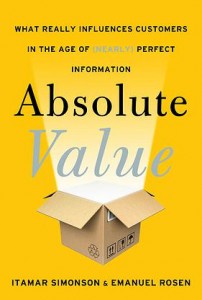Stanford Professor, Itmar Simonson, Questions 21st Century Marketing
Originally published on Microsoft for Work on March 18, 2014.
In his new book, Absolute Value, Stanford Professor Itamar Simonson sets up the question: what does it mean when the traditional notions of marketing don’t stand up in 21st century? In doing so, he reveals what really influences customers today and offers a new framework to challenge those notions of traditional marketing. A few weeks ago, we had the pleasure of attending a lecture and interviewing Professor Simonson, as part of the Microsoft Research Visiting Speaker Series to get a little more insight on this topic.
 Simonson argued consumers can now access nearly perfect information via the Internet and have transitioned from being relative to absolute decision makers. What does that mean? In the case of Absolute Value, his thesis states that, for any sufficiently important consumer purchase, business can no longer rely on just being the most attractive option on the shelf but must embrace a marketplace that is driven by online reviews.
Simonson argued consumers can now access nearly perfect information via the Internet and have transitioned from being relative to absolute decision makers. What does that mean? In the case of Absolute Value, his thesis states that, for any sufficiently important consumer purchase, business can no longer rely on just being the most attractive option on the shelf but must embrace a marketplace that is driven by online reviews.
Simonson then proceeded to explain what this technology revolution means for the five major pillars of traditional marketing; he previewed his lecture by saying “when consumers can predict the absolute value of products, the power of marketing is lost…”
Quality no longer tied to brand
Companies can’t rest on their laurels in the age of absolute value. Simonson made cases to dismantle the idea that brand names still serve as a proxy for quality. He settled on the example of ASUS, a computer manufacturer. Previously a computer component maker, consultants argued that it didn’t stand a chance of successfully transitioning away from manufacturing parts for others. ASUS gambled that if it could make a quality product that was well received (it was) it could overcome the massive traditional barrier to entry in this highly competitive market. The company was right. ASUS is now one of the top five device manufacturers in the world.
Companies cannot rely on customer loyalty
“What have you done for me lately?” is how consumers react to everything now, according to Simonson. He cited one study in particular from Deloitte showing that even in the hospitality industry with all its rewards plans, only 8% of people “always stay at the same hotel brand.” What you can offer the customer now defines success in every industry, not the legacy your brand might have. Sounds scary, but Simonson argued that this trend gives companies much better opportunities for second chances.
The information environment enables consumers to be rational
| If companies continue to believe they can exert a stronger influence over customers than the rapidly growing power of reviews, they are in for a shock. |
Without directly picking a fight with Predictably Irrational’s author Dan Ariely, Simonson acknowledged that just as the field of behavioral economics has come into its own, it is becoming less and less relevant. If companies continue to believe they can exert a stronger influence over customers than the rapidly growing power of reviews, they are in for a shock. Online reviews and the age of nearly perfect information mean that customers can know exactly what to expect when buying almost everything.
Positioning and targeting your product is harder than ever (so maybe you shouldn’t try)
The failure of the HTC Facebook phone was cited by Simonson as the perfect example of how traditional paradigms about product positioning simply do not work anymore. The concept must have sounded foolproof to HTC executives. “Facebook is popular, so our phone that has a Facebook button will therefore also be popular.” Turns out the phone didn’t really offer anything but brand positioning, and the reviewers knew it. The phone was almost universally panned as a result.
On the other side of this coin, Simonson argued that the democratizing effect of online reviews means marketers cannot dictate how consumers should use their products. And a marketplace with nearly perfect information available to everyone enables consumers to find and buy the products that really speak to them. Essentially, you can’t force certain demographics to buy from you, but you can create quality products that speak for themselves.
Market research isn’t about predicting; now it’s about tracking
When it comes to market research, Simonson pointed out that “consumers are notoriously bad at predicting what they are going to want in the future.” Market Research’s focus should shift from trying to predict the trends to actually measuring them in real time. The true power of the “other” for marketers is as a giant, real-time focus group feeding companies data for free all the time. According to Simonson, market researchers should spend less time trying to measure consumer preferences, and lots more time measuring what they are already telling companies on social media and other online channels.
In his book, Professor Simonson has identified those cornerstone concepts of traditional marketing and explained why they no longer hold up today. With a market full of absolute decision makers, how will your business adapt? What are the new “best practices” for this reimagined marketing framework?
To learn more about Absolute Value check out the book’s site here.
This post is part of our ongoing coverage of Microsoft Research and its Visiting Speaker Series. Microsoft Research supports its mission to educate and foster innovation and growth through inviting authors and speakers that inspire big ideas, spark new ways of doing things, or help people see things from a new perspective.
